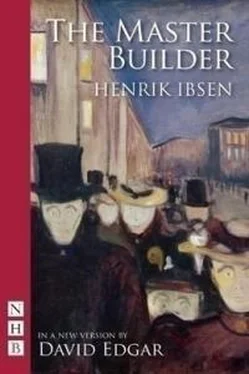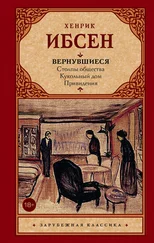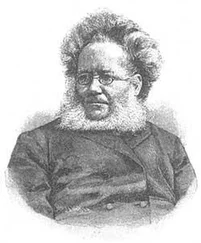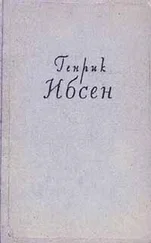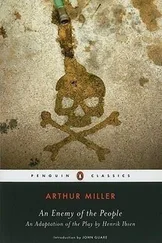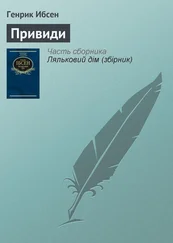HILDA.
Yes, it does. And if she is so good—as you say she is—why should she talk in that way?
SOLNESS.
But, good Lord, what would you have had her say, then?
HILDA.
She might have said she would do it because she had taken a tremendous fancy to me. She might have said something like that—something really warm and cordial, you understand.
SOLNESS.
[Looks at her.] Is that how you would like to have it?
HILDA.
Yes, precisely. [She wanders about the room, stops at the bookcase and looks at the books.] What a lot of books you have.
SOLNESS.
Yes, I have got together a good many.
HILDA.
Do you read them all, too?
SOLNESS.
I used to try to. Do you read much?
HILDA.
No, never! I have given it up. For it all seems so irrelevant.
SOLNESS.
That is just my feeling.
[HILDA wanders about a little, stops at the small table, opens the portfolio and turns over the contents.
HILDA.
Are all these your drawings yours?
SOLNESS.
No, they are drawn by a young man whom I employ to help me.
HILDA.
Some one you have taught?
SOLNESS.
Oh yes, no doubt he has learnt something from me, too.
HILDA.
[Sits down.] Then I suppose he is very clever. [Looks at a drawing.] Isn't he?
SOLNESS.
Oh, he might be worse. For my purpose—
HILDA.
Oh yes—I'm sure he is frightfully clever.
SOLNESS.
Do you think you can see that in the drawings?
HILDA.
Pooh—these scrawlings! But if he has been learning from you—
SOLNESS.
Oh, so far as that goes—there are plenty of people here that have learnt from me, and have come to little enough for all that.
HILDA.
[Looks at him and shakes her head.] No, I can't for the life of me understand how you can be so stupid.
SOLNESS.
Stupid? Do you think I am so very stupid?
HILDA.
Yes, I do indeed. If you are content to go about here teaching all these people—
SOLNESS.
[With a slight start.] Well, and why not?
HILDA.
[Rises, half serious, half laughing.] No indeed, Mr. Solness! What can be the good of that? No one but you should be allowed to build. You should stand quite alone—do it all yourself. Now you know it.
SOLNESS.
[Involuntarily.] Hilda—!
HILDA.
Well!
SOLNESS.
How in the world did that come into your head?
HILDA.
Do you think I am so very far wrong then?
SOLNESS.
No, that's not what I mean. But now I'll tell you something.
HILDA.
Well?
SOLNESS.
I keep on—incessantly—in silence and alone—brooding on that very thought.
HILDA.
Yes, that seems to me perfectly natural.
SOLNESS.
[Looks somewhat searchingly at her.] Perhaps you have noticed it already?
HILDA.
No, indeed I haven't.
SOLNESS.
But just now—when you said you thought I was—off my balance? In one thing, you said—
HILDA.
Oh, I was thinking of something quite different.
SOLNESS.
What was it?
HILDA.
I am not going to tell you.
SOLNESS.
[Crosses the room.] Well, well—as you please. [Stops at the bow–window.] Come here, and I will show you something.
HILDA.
[Approaching.] What is it?
SOLNESS.
Do you see over here in the garden—?
HILDA.
Yes?
SOLNESS.
[Points.] Right above the great quarry—?
HILDA.
That new house, you mean?
SOLNESS.
The one that is being built, yes. Almost finished.
HILDA.
It seems to have a very high tower.
SOLNESS.
The scaffolding is still up.
HILDA.
Is that your new house?
SOLNESS.
Yes.
HILDA.
The house you are soon going to move into?
SOLNESS.
Yes.
HILDA.
[Looks at him.] Are there nurseries in that house, too?
SOLNESS.
Three, as there are here.
HILDA.
And no child.
SOLNESS.
And there never will be one.
HILDA.
[With a half–smile.] Well, isn't it just as I said—?
SOLNESS.
That—?
HILDA.
That you are a little—a little mad after all.
SOLNESS.
Was that what you were thinking of?
HILDA.
Yes, of all the empty nurseries I slept in.
SOLNESS.
[Lowers his voice.] We have had children—Aline and I.
HILDA.
[Looks eagerly at him.] Have you—?
SOLNESS.
Two little boys. They were of the same age.
HILDA.
Twins, then.
SOLNESS.
Yes, twins. It's eleven or twelve years ago now.
HILDA.
[Cautiously.] And so both of them—? You have lost both the twins, then?
SOLNESS.
[With quiet emotion.] We kept them only about three weeks. Or scarcely so much. [Bursts forth.] Oh, Hilda, I can't tell you what a good thing it is for me that you have come! For now at last I have some one to talk to!
HILDA.
Can you not talk to—her, too?
SOLNESS.
Not about this. Not as I want to talk and must talk. [Gloomily.] And not about so many other things, either.
HILDA.
[In a subdued voice.] Was that all you meant when you said you need me?
SOLNESS.
That was mainly what I meant—at all events, yesterday. For to–day I am not so sure—[Breaking off.] Come here and let us sit down, Hilda. Sit there on the sofa—so that you can look into the garden. [HILDA seats herself in the corner of the sofa. SOLNESS brings a chair closer.] Should you like to hear about it?
HILDA.
Yes, I shall love to sit and listen to you.
SOLNESS.
[Sits down.] Then I will tell you all about it.
HILDA.
Now I can see both the garden and you, Mr. Solness. So now, tell away! Begin!
SOLNESS.
[Points towards the bow–window.] Out there on the rising ground—where you see the new house—
HILDA.
Yes?
SOLNESS.
Aline and I lived there in the first years of our married life. There was an old house up there that had belonged to her mother; and we inherited it, and the whole of the great garden with it.
HILDA.
Was there a tower on that house, too?
SOLNESS.
No, nothing of the kind. From the outside it looked like a great, dark, ugly wooden box; but all the same, it was snug and comfortable enough inside.
HILDA.
Then did you pull down the ramshackle old place?
SOLNESS.
No, it was burnt down.
HILDA.
The whole of it?
SOLNESS.
Yes.
HILDA.
Was that a great misfortune for you?
SOLNESS.
That depends on how you look at it. As a builder, the fire was the making of me—
HILDA.
Well, but—
SOLNESS.
It was just after the birth of the two little boys—
HILDA.
The poor little twins, yes.
SOLNESS.
They came healthy and bonny into the world. And they were growing too—you could see the difference day to day.
HILDA.
Little children do grow quickly at first.
SOLNESS.
It was the prettiest sight in the world to see Aline lying with the two of them in her arms.—But then came the night of the fire—
HILDA.
[Excitedly.] What happened? Do tell me! Was any one burnt?
SOLNESS.
No, not that. Every one got safe and sound out of the house—
HILDA.
Well, and what then—?
SOLNESS.
The fright had shaken Aline terribly. The alarm—the escape—the break–neck hurry—and then the ice–cold night air—for they had to be carried out just as they lay—both she and the little ones.
HILDA.
Was it too much for them?
SOLNESS.
Oh no, they stood it well enough. But Aline fell into a fever, and it affected her milk. She would insist on nursing them herself; because it was her duty, she said. And both our little boys, they—[Clenching his hands.]—they—oh!
Читать дальше
